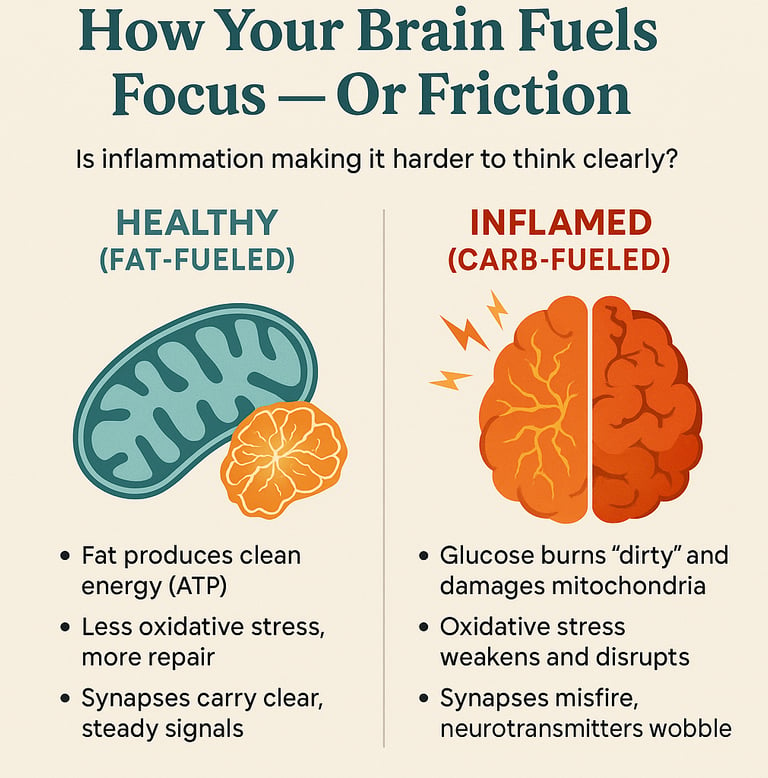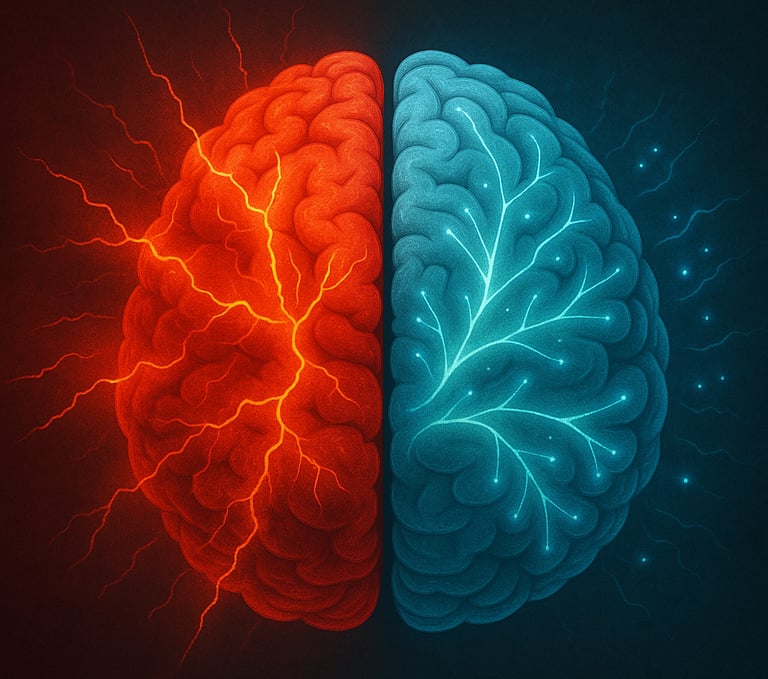What If Your Pre-Show Meltdowns Aren’t Mental — But Metabolic?
It’s not your mindset. It’s your mitochondria. (What musicians don’t realize about stress, nerves, and the food that fuels them.)
NUTRITIONHEALTH
Naama Neuman
8/25/20255 min read
You know you’re prepared. The notes are there. The technique is solid.
But the week before a big audition, you start to snap at small things. You can’t think straight. Your chest feels tight. Sleep is lighter. Your brain jumps from one worst-case scenario to the next. And when the concert day comes, your heart is racing, your mouth is dry, your hands are sweaty — and all you can think about is what might go wrong.
Back then, I thought I just needed better mental strategies. What I didn’t realize was that my brain was already inflamed — and couldn’t respond the way it should.
That was me. For most of my career.
I wasn’t nervous because I wasn’t ready — I was nervous because my brain couldn’t handle the pressure.
And no one ever told me it might be metabolic.
The Pattern I Never Questioned
From the outside, I seemed fine. But I lived with a quiet undercurrent of tension. Especially around food.
I’d been like this since I was a kid — irritable when hungry, and often hungry. My family learned to give me more space leading up to big events, and my mom would gently remind me to let go a few days early so I wouldn’t burn out before I even got on stage.
I thought I was being disciplined: oatmeal for breakfast, fruit and nuts between sessions, soy milk in coffee, quinoa salads, tofu, noodles with lots of vegetables, energy bars, the occasional chicken or fish. I grazed throughout the day believing it was the healthiest way to stay energized.
But even though I was “doing everything right,” I didn’t feel well. I chalked it up to being tired, sensitive, maybe just a little overworked. But looking back, I can see I was inflamed — and not just in my joints.
I had ongoing tendonitis, bouts of adult acne, flares of ulcerative colitis, and episodes of depression. I felt stuck in a body that wasn’t recovering the way it should.
What Food Has to Do with Mood, Focus, and Nerves
Every time you eat, your body creates a small inflammatory response — a normal part of metabolism. But the type of fuel matters.
Meals based on sugar and starch — including “healthy carbs” like oats, bananas, fruit, sweet potatoes, and whole grains — cause larger blood sugar spikes. That spike is followed by a stronger inflammatory wave than meals based on fat and protein. And that inflammation hits your brain the hardest.
Carbohydrates also require more oxygen to burn than fat and generate more reactive oxygen species — toxic byproducts that build up inside your brain’s mitochondria (the energy factories of your cells). Over time, this leads to oxidative stress — a kind of internal rust — that damages those mitochondria and slows their ability to make clean, efficient fuel (ATP).
Or as Dr. Georgia Ede puts it:
“Glucose burns dirty. Fat burns clean.”
When your meals are carb-heavy — and frequent, as mine were — your mitochondria run hot and fast without pause. You eat. Blood sugar rises. Inflammation spikes. And before it resolves, you eat again. The system never clears.
Eventually, mitochondrial output drops. And when that happens, the brain struggles to focus, regulate emotion, and reset after stress.


You may not notice it at first. But as inflammation accumulates, repair slows. Synapses (the connections between neurons) fire less cleanly. Myelin (the insulation that keeps nerves fast and responsive) weakens. Neurotransmitters like GABA, dopamine, and serotonin wobble.
You don’t just lose focus — you lose emotional resilience.
“Mental disorders are metabolic disorders of the brain.” — Dr. Chris Palmer
And it doesn’t take a diagnosis to be affected.
Signals of Brain Inflammation Musicians Often Miss
These symptoms were with me for years, but I never connected them to food:
Constant low-level anxiety and episodes of depression
A mind that jumped to the negative despite external progress
Trouble sleeping, especially during concert weeks
Adult acne that wouldn’t go away
Sensory overload — especially to sound and smell
Getting thrown off by mistakes in rehearsal
Tendonitis that kept coming back
Difficulty building muscle despite training
A creeping sense of disengagement before auditions
Feeling fragile or withdrawn, even when I wanted to care
These weren’t just “stress symptoms.” They were signs of brain inflammation I’d been living with for years — and normalizing.
What I Changed — and What Happened Next
I wasn’t trying to fix all of this at once. I just wanted to feel better. But when I shifted to an animal-based, low-carb diet, the changes came quickly and steadily:
Removed grains, sugars, and starchy snacks. No more energy bars, sweet potatoes, bananas, mangoes, or oatmeal. Just a handful of berries if needed.
Ate real meals: steak, eggs and bacon, liver pâté, lamb chops, butter, cheese.
Stopped grazing: Not because I made a rule, but because I wasn’t hungry between meals.
Switched to full-fat drinks: I traded soy milk for heavy cream or butter in my coffee and tea.
What happened:
My anxiety lifted after just a few weeks.
I stopped yawning mid-morning.
My thoughts felt steadier. I could hold focus longer.
I didn’t spiral before concerts. I stayed calm — and curious.
I regained body mass, felt less fragile, and recovered faster.
And I started to feel like myself — maybe for the first time.
What to Do If You’re Not Sure Food Is the Issue
If you’ve already tried journaling, breath work, or even therapy — and still feel like something isn’t clicking — you may need to support your metabolism, not your mindset.
Start with this:
Eat fat and protein first. Eggs, beef, lamb, liver, cheese, bacon, butter.
Lower carbs. Stay under 100g/day to start. If you deal with anxiety, mood swings, or a diagnosed mental health condition, a ketogenic range of under 20g/day may be more effective.
Cut out processed foods. Especially those containing sugar, grains, and seed oils.
Track how you feel. Don’t just count macros. Track mood, focus, resilience, and sleep.
If you’re on medication or under medical care, consult your doctor — and learn from the best. I recommend reading:
Your Brain Wants to Work — It Just Needs the Right Environment
For years, I thought food had nothing to do with how I felt mentally. In fact, I believed that how I felt was who I was — anxious, tired, irritable, highly sensitive. I just accepted it. I assumed I’d have to manage it forever.
Then I changed what I ate, and the fog lifted.
I started The Focused Musician newsletter to share what I wish I’d known earlier. Because for musicians, food isn’t just about health — it’s about access to your craft. And if you’re still feeling blocked, even when everything else looks good on paper… food might be the piece you’ve never been told to question.


